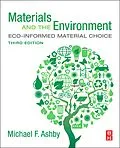Materials and the Environment, Third Edition, discusses the history of our increasing dependence on materials and energy. The book explains where materials come from and how they are used in a variety of industries, along with their lifecycle and relationship to energy and carbon. In addition, it covers the controls and economic instruments that hinder the use of engineering materials, considers sustainability from a materials perspective, and highlights the importance of low-carbon power and material efficiency. Further sections cover the mechanical, thermal and electrical properties of engineering metals, polymers, ceramics, composites and natural materials and their relationship to environmental issues. This book is intended for instructors and students of Engineering, Materials Science and Industrial/Product Design, as well as for materials engineers and product designers who need to consider the environmental implications of materials in their designs. - Introduces methods and tools for thinking about, and designing with, materials within the context of their role in products and the environmental consequences - Contains numerous case studies showing how the methods discussed in the book can be applied to real-world situations - Includes full-color datasheets for dozens of the most widely used materials, featuring such environmentally relevant information as their annual production and reserves, embodied energy and process energies, carbon footprints, and recycling data
Autorentext
Royal Society Research Professor Emeritus at Cambridge University and Former Visiting Professor of Design at the Royal College of Art, London, UK
Mike Ashby is sole or lead author of several of Elsevier's top selling engineering textbooks, including Materials and Design: The Art and Science of Material Selection in Product Design, Materials Selection in Mechanical Design, Materials and the Environment, and Materials: Engineering, Science, Processing and Design. He is also coauthor of the books Engineering Materials 1&2, and Nanomaterials, Nanotechnologies and Design.
Klappentext
Materials and the Environment, Third Edition, discusses the history of our increasing dependence on materials and energy. The book explains where materials come from and how they are used in a variety of industries, along with their lifecycle and relationship to energy and carbon. In addition, it covers the controls and economic instruments that hinder the use of engineering materials, considers sustainability from a materials perspective, and highlights the importance of low-carbon power and material efficiency. Further sections cover the mechanical, thermal and electrical properties of engineering metals, polymers, ceramics, composites and natural materials and their relationship to environmental issues.
This book is intended for instructors and students of Engineering, Materials Science and Industrial/Product Design, as well as for materials engineers and product designers who need to consider the environmental implications of materials in their designs.
- Introduces methods and tools for thinking about, and designing with, materials within the context of their role in products and the environmental consequences
- Contains numerous case studies showing how the methods discussed in the book can be applied to real-world situations
- Includes full-color datasheets for dozens of the most widely used materials, featuring such environmentally relevant information as their annual production and reserves, embodied energy and process energies, carbon footprints, and recycling data
Inhalt
1. Introduction: material dependence
2. Resource consumption and its drivers
3. The materials life-cycle
4. End of first life: a problem or a resource?
5. The long reach of legislation
6. Eco-data: values, sources, precision
7. Eco-audits and eco-audit tools
8. Case studies: eco-audits
9. Material selection strategies
10. Eco-informed material selection
11. Renewable materials, Natural materials
12. Criticality and Supply-Chain Risk
13. Circular Materials Economics
14. Materials and Sustainability
15. Appendix A. Material Property Data
16. Appendix B. Eco and Supply-chain Data
